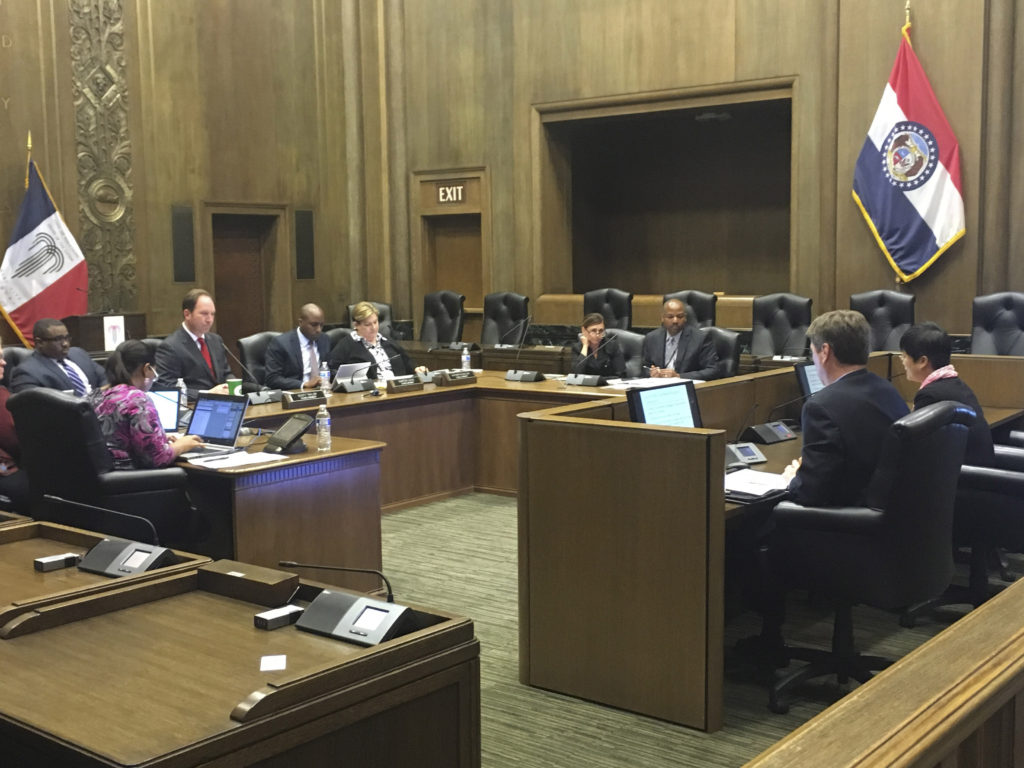
By Paul Thompson
Northeast News
May 3, 2017
KANSAS CITY, Missouri – The KCMO City Auditor’s office presented 10 recommendations to the Independence Avenue Community Improvement District during the Planning, Zoning, and Economic Development Committee meeting on Wednesday, April 26.
The Auditor’s Office presentation, entitled “Independence Avenue Community Improvement District should Improve Accountability and Transparency,” highlighted findings such as inappropriate payments and reimbursements, failure to follow check controls, and insufficient segregation of duties. Auditors also found that requirements surrounding possible conflicts of interest were not met, the CID did not comply will all established requirements, and that further transparency could be provided to stakeholders by improving the content of the CID’s website.
“As a public body, we should be transparent to the public,” said KCMO City Auditor Doug Jones. “Those are the two main issues that we saw in this report: weak internal controls that could put those public monies at risk, and a lack of transparency in how the board was operating towards the public.”
Jones was perhaps most concerned about errors that were found in expense reports pulled by KCMO auditors. The audit focused on expenditures from January 2016 and April 2016.
“We only looked at two months worth of expense records, and we found an error rate of 40%. That’s not very good to find that many errors,” said Jones. “Between the two months that we looked at, that was about $20,000 in errors. While we were looking into the expense reports and trying to identify documents, we found another $17,000. We found $37,000 in errors or potential errors. The $20,000 was about 18% of expenditures in January and April of 2016. That’s a significant amount of money.”
One of the recurring issues was a lack of proper documentation for purchases. Sometimes, expenses were simply recorded on a hand-written check register. At other times, there was no invoice or receipt.
“There was one $800 check written out to cash without any supporting document except a handwritten note of ‘landscapers’ on the check stub. That’s not adequate documentation to support an expenditure of public tax monies,” Jones said. “We also found some things that they reimbursed the Chamber for that should have been covered under their 18% management fee.”
The auditors had further concerns about the 18% management fee collected by the Northeast Kansas City Chamber of Commerce. The managing agency fee was raised from 15% in April of 2015, but the increase wasn’t properly documented.
“We couldn’t find any discussion of it from the Chamber side that had been written down. That was something that they said: they had discussed it, but there was nothing written down from the Chamber side,” said Jones. “So from the record that we have to review, we see it just coming from the CID, saying here’s another three percentage points.”
In another example, Jones described how yearly budgets were being submitted after mandated deadlines.
“Their 2015 budget was adopted on July 3. They use the same fiscal year as the city – May 1. So this is two months after the fiscal year began. They’re supposed to adopt it 30 days before the fiscal year began,” said Jones. “2016 and 2017 were adopted earlier, but were both after the statutory deadline.”
Planning, Zoning, and Economic Development Committee members noted that the findings – and the need to improve certain practices – don’t negate the work being done along Independence Avenue.
“The CID is a wonderful tool if used properly, and I think they’ve seen some great results on the Independence Avenue corridor through the use of the CID,” said 6th District Councilman Scott Taylor. “There’s no question about that.”
As the first of Kansas City’s CID’s to be audited by the City Auditor’s office, the Planning, Zoning, and Economic Development Committee members recognized that the Independence Avenue CID served as something of a guinea pig for the whole area. Taylor even suggested finding a way to package the recommendations contained within the performance audit to distribute to other municipal CID’s in order to give them a template for appropriate practices. Independence Avenue CID Chairman Bobbi Baker-Hughes agreed that the audit process could be useful for neighboring CID’s.
“Everything that’s in these recommendations, I could see how every CID could benefit,” said Baker-Hughes. “These are things that could certainly help all CID’s.”
In a written response to the findings, the Independence Avenue CID agreed to implement all 10 recommendations from the Auditor’s Office. Baker-Hughes appeared before the Committee to explain how the audit has helped the entity.
“There are things that we’re still learning. One of the things that the audit has done is to prioritize some of those techniques and tactics that we need to employ in order to make certain that we are accountable and transparent,” said Baker-Hughes. “We want to be transparent, so we are in agreement with all 10 recommendations.”
With the audit completed, Baker-Hughes believes that the Independence Avenue CID can utilize the findings to run a better, tighter organization. The CID has already taken at least one step in that direction: attached with their letter formally accepting the audit’s recommendations is an updated template for meeting agendas aimed to help ensure that the organization is as transparent as possible – and that state statutes are being followed as required.
“I think that we’ll have more information available to the community. The audit will be over, so we can move forward and continue to do more good work,” said Baker-Hughes. “We get to get back to the good things, and make the audit a good thing. All too often, people think that audits are a bad deal, but they’re designed to show you where you can become stronger.”
The Auditor’s Office will be following up with the Independence Avenue CID later this year to ensure that the recommendations have been implemented.
“I just want to thank the CID board and staff for all their assistance and cooperation throughout the audit,” said Jones. “In six months, we’ll come back and let you know how they are doing implementing the recommendations that we’ve made.”


















